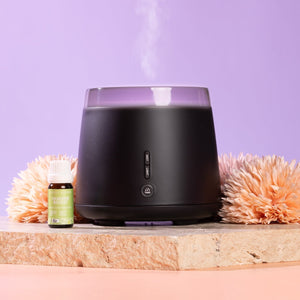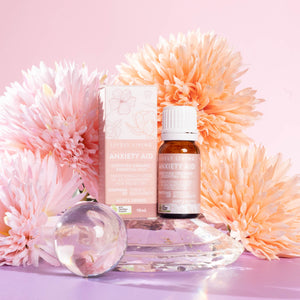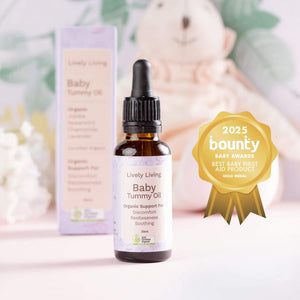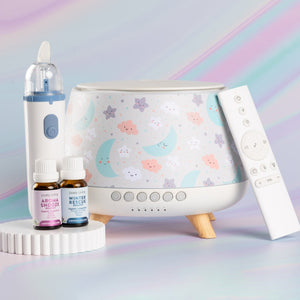Peppermint Essential Oil Benefits and Uses for Health
Peppermint essential oil benefits and uses are almost endless. From easing digestive issues to promoting hair growth and containing antimicrobial properties, it's no wonder this refreshing essential oil has remained popular throughout history. But with so much information floating around, it's important to understand how to safely and effectively utilize this versatile oil. Let’s explore peppermint essential oil.
Table Of Contents:
- Understanding Peppermint Essential Oil
- Peppermint Essential Oil Benefits
- Peppermint Essential Oil Uses
- Choosing High-Quality Peppermint Oil
- Peppermint Essential Oil: Side Effects and Precautions
- FAQs about Peppermint essential oil benefits and uses
- Conclusion
Understanding Peppermint Essential Oil
Peppermint essential oil, a hybrid of watermint and spearmint, boasts a history dating back thousands of years. The peppermint plant is part of the mint family and is native to North America.
It's created by extracting oil from the plant's leaves and flowering parts, yielding a potent concentration known for its signature minty aroma and refreshing taste. Peppermint oil is commonly used as a flavoring agent in a wide variety of products. One of its main chemical components, menthol, gives it a cooling sensation.
One of the reasons for its wide-reaching benefits is its diverse chemical composition. Comprised of over 40 different compounds, the star player is undoubtedly menthol. It's what provides those cooling sensations and contributes to many of peppermint oil's therapeutic properties. Menthol and menthone are the two primary chemical components of peppermint essential oil.
Peppermint Essential Oil Benefits
Peppermint essential oil benefits are wide-ranging and supported by both scientific studies and anecdotal evidence. It is said to be beneficial in relieving pain, improving blood flow, and easing the symptoms of irritable bowel syndrome.
Digestive Relief
A 2019 review found that peppermint oil, taken in enteric-coated capsules, was effective at reducing common symptoms of Irritable Bowel Syndrome (IBS), including stomach pain and abdominal pain. Researchers suggest the menthol content may play a role in these benefits. This is why you often see peppermint oil capsules recommended to help with various digestive issues.
A separate 2019 review discovered that peppermint oil, menthol, and caraway oil, worked well for alleviating indigestion and other issues affecting the GI tract. Consuming peppermint oil can also help to relieve pain associated with functional dyspepsia. Peppermint essential oil is known for potentially easing the pain and diarrhea often associated with IBS.
Nausea and Vomiting
While research is ongoing, a 2021 study discovered that applying a drop of peppermint essential oil between the nose and upper lip three times a day for 5 days after chemo treatment helped minimize both the frequency and harshness of vomiting and nausea. This can also help those who experience nausea and vomiting associated with postoperative nausea.
However, more studies are needed in this area, and you should always consult a doctor before using peppermint essential oil. Peppermint essential oil can interact with certain medications so it is always important to consult your doctor before consuming peppermint or using peppermint oil.
Pain Relief
Many find peppermint oil helpful for easing various types of pain, including abdominal pain, chest pain, and other types of pain. This is due in part to menthol's cooling sensation, which, when applied topically, can create a numbing effect. For example, a 2019 study indicated that applying peppermint oil drops intranasally was useful for minimizing the frequency and severity of migraines.
And research shows that peppermint essential oil isn't limited to just headache relief. The Department of Agriculture Human Nutrition Research Center on Aging at Tufts University uncovered that peppermint boasts significant antimicrobial and antiviral properties. This is particularly important for anyone who suffers from chronic inflammatory disorders.
Skin and Hair Benefits
Peppermint essential oil may also offer advantages for the hair and skin. Research has shown that peppermint oil can be effective for a wide variety of conditions including Staphylococcus aureus, Escherichia coli, and Candida yeast.
A small 2016 study revealed that peppermint essential oil effectively relieves chronic itching. Some people use peppermint oil mixed with other ingredients for hair growth. Always make sure to do a patch test when using peppermint oil on your skin.
Meanwhile, a 2014 study suggested that topical application of peppermint oil may promote hair growth in a way similar to minoxidil.
Peppermint Essential Oil Uses
Peppermint essential oil can be utilized in various ways, such as aromatherapy, oral ingestion, and topical application.
Aromatherapy
Many love adding a few drops of peppermint oil to a diffuser. Diffusing essential oils offer a wonderful way to enjoy its aroma, which may help improve alertness and memory. You can also add peppermint oil to a bowl of steaming water, creating your own personal steam inhalation experience, perfect for when a cold or allergies leave you feeling congested. Inhaling peppermint oil can be beneficial for some people.
Interested in blending peppermint essential oil with other complementary essential oils? It mixes well with:
- Lavender Essential Oil
- Eucalyptus Essential Oil
- Lemon Essential Oil
- Rosemary Essential Oil
Topical Application
You can apply peppermint essential oil directly to your skin, although remember, it must first be diluted in a carrier oil to prevent irritation. Popular carrier oils include jojoba oil, coconut oil, or almond oil.
Wondering where to apply peppermint essential oil? Here are a few ideas:
- Temples or forehead (for headaches)
- Chest or back (for congestion)
- Abdomen (for digestive issues)
- Muscles and joints (for aches and pains)
Oral Ingestion
You'll sometimes find peppermint essential oil in the form of enteric-coated capsules, designed to dissolve in the intestines rather than the stomach. Peppermint extract is also used for adding flavor in foods and drinks, as well as in oral care products, like mouthwash.
Because of potential risks, such as interactions with certain medications or digestive discomfort, always check with a healthcare provider before taking peppermint oil internally. Peppermint oil can have adverse effects when combined with certain medications.
Choosing High-Quality Peppermint Oil
Not all peppermint essential oils are created equal. To experience all of the peppermint essential oil benefits and uses, always seek out a reputable brand and check the label to make sure you're getting a high-quality product. You should also know the signs of quality when it comes to essential oil. Certified Organic Essential Oils, regulated and tested by a third party are usually the best indicator that it is a quality product.
Factors to consider
- Labeling: Should clearly state Certified Organic along with the plant's Latin name (Mentha piperita) and country of origin.
- Packaging: Often found in dark amber or cobalt blue glass bottles to safeguard the oil from damaging UV rays.
- Price; Avoid brands that are priced incredibly low, which may signal a lower quality. Remember, high-quality essential oils are an investment.
- Reputation: Opt for brands that prioritize ethical sourcing practices, have positive reviews, and demonstrate a strong understanding of essential oil production.
Peppermint Essential Oil: Side Effects and Precautions
Although generally safe, peppermint essential oil side effects are possible. Always start with a small amount to test your tolerance and dilute before topical use or ingestion. If you are pregnant, nursing, or have any medical condition, you should talk to your doctor before ingesting or using peppermint oil.
Possible Side Effects
When applied to the skin:
- Rashes
- Redness
- Itching
- Burning Sensations
When ingested:
- Heartburn
- Nausea
- Vomiting
Precautions
It's generally advisable to steer clear of using peppermint oil on babies and young children. Spearmint is a gentle alternative. Avoid contact with eyes, inner ears, and other sensitive areas. If experiencing any severe or unusual side effects, stop use and consult with your doctor right away. This information should not substitute for advice from your healthcare professional.
FAQs about Peppermint essential oil benefits and uses
What is peppermint essential oil good for?
Peppermint oil is known for its ability to provide relief from various ailments, especially digestive issues like IBS. But its uses span much wider, offering potential benefits for headaches, muscle pain, congestion, and even as a topical application for skin and hair concerns. Remember that while anecdotal evidence and traditional uses are plentiful, continued research is important for fully understanding the scope of its effects.
What are the 10 uses of peppermint?
Ten potential benefits of using peppermint oil include:
- Relieving digestive discomfort (like IBS symptoms, indigestion)
- Minimizing nausea
- Easing headaches
- Alleviating muscle and joint pain
- Clearing congestion
- Promoting hair growth
- Soothing itchy skin
- Boosting energy and focus
- Freshening breath
- Repelling certain insects
Where do you put peppermint oil on your body?
Always dilute peppermint oil with a carrier oil like coconut oil or jojoba oil before applying it to the skin. You can then gently rub it on your temples, chest, abdomen, or any area experiencing pain or discomfort. It's important to start with a small amount. Always remember to listen to your body. Discontinue use immediately if irritation occurs. If you have any concerns or are uncertain how to safely apply it, reach out to your healthcare provider or certified aromatherapist for personalized guidance.
What are the healing properties of peppermint?
Although more research is necessary, some studies suggest potential therapeutic properties including:
- Anti-inflammatory Effects
- Antimicrobial Properties
- Antiviral Actions
- Antioxidant Qualities
- Pain-Relieving Abilities
- Digestive Support
Always consult a medical professional before using it as a treatment. They're the best guide to ensure you’re using essential oils safely and effectively within your individual health context.
Conclusion
From topical application for muscle aches to aromatherapy for boosting focus, peppermint essential oil benefits and uses make it a powerful addition to any natural wellness routine. It's an adaptable and multifaceted oil,.
Yours in good health
Julie and the Lively Living Team


























